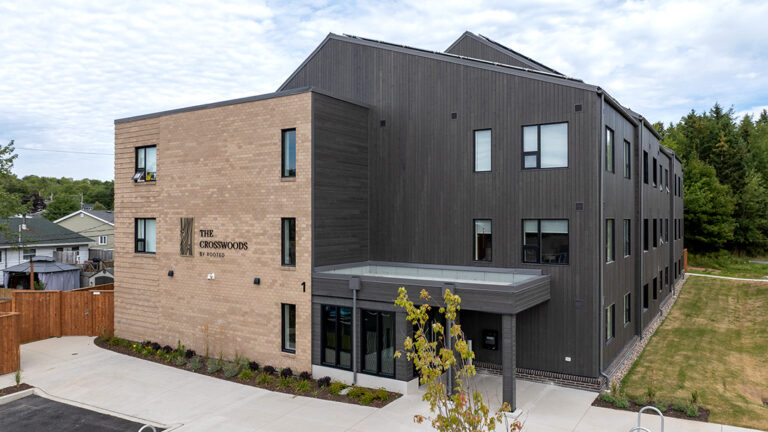The Community Housing Growth Fund (CHGF) is a funding model originally developed for Nova Scotia in collaboration with the provincial government. It is a small revolution for the province, with the transformational potential to spread like wildfire across the country.
This fund has laid the foundation for a strong partnership between government and the community housing sector. It has proven to strengthen the community’s position and create greater opportunities for growth by ensuring the sector has the tools and resources it needs to increase the supply of community housing.
“At the Centre, we advocate that a larger portion of the rental market in Nova Scotia be under the ownership and governance of the community housing sector. To achieve this, non-profit housing providers must have the means to undertake both renovation and new housing projects. The growth fund is an essential tool for achieving this objective,” points out Stephan Richard, the Centre’s Director of Development.
The model is distinguished by its agility, drawing on the expertise and flexibility of the community. Most subsidy programs take a long time to set up and deliver, whereas the Growth Fund model opts for a flexible, dynamic approach to its activities. The fund has been warmly welcomed by Nova Scotia’s community housing sector, which is under increasing pressure to respond to the growing housing crisis. Given the scarcity of other available sources of funding, the provincial government’s support for the sector through the Community Housing Growth Fund (CHGF) is timely.
While the Centre’s role is to manage the operationalization strategy and fund allocation, the government’s is to set targets and monitor results. This collaborative approach, coupled with the Centre’s IT infrastructure, has proved that it is possible to act quickly while still effectively reaching targets.
Evolving goals and innovative projects
The fund has been very well received by Nova Scotia’s community housing sector, which is under increasing pressure to respond to the growing housing crisis. It has quickly proven itself as a powerful lever for community real estate development.
“Since the Community Housing Growth Fund started providing financial support to the community housing sector, we have observed an increase in project activity from not-for-profit housing organizations across the province. This signals strong momentum for growth and transformation within the community housing sector and offers encouragement as collectively we seek to address the province’s long-term housing needs,” says Vicki Elliott-Lopez, Senior Executive Director at Municipal Affairs and Housing.
Given the scarcity of other available sources of funding, the provincial government’s support for the sector through the CHGF has come at an opportune time.
Our Nova Scotia Program Officer, Alison Lair, notes that “The funding has certainly enabled groups to access resources they wouldn’t have been able to before. It’s taken a burden off their shoulders. But most importantly, our process benefits small organizations by inviting them to develop a detailed work plan, to better understand the scope of their project, and to identify potential obstacles that may arise early on. By going through this process, they can be better prepared to make the most of the resources at their disposal.”
The fund has already supported, to the tune of $2.2 million, 55 projects that could have a major impact on their communities and demographics, focusing on land use, community partnerships, and ensuring support for vulnerable groups. This remarkable success led to the government’s decision to double the investment and implementation period, and to enter into an additional agreement with the Centre. Initially endowed with 2.5 million dollars, the fund now totals 7 million dollars, of which at least 2 million will go to Black organizations.
Support for Black communities
Recognizing the specific challenges faced by Black communities, the Nova Scotia government has set aside $2,000,000 from the Fund for projects by these groups. This reserve represents a clear commitment to black led, black focused and black serving organizations. Nova Scotia has a long history of Black communities, and it is essential to ensure that the funds allocated benefit these groups.
The goal goes beyond funding by facilitating the development of self-sufficient, resilient entities entering the community housing sector. The emphasis is on the groundwork needed to advance the growth of these organizations and create sustainable entities that can continue to benefit from support.
The projects selected focus primarily on land-based initiatives, such as community land trusts. The long history of Black communities in Nova Scotia influences this approach, which focuses on rebuilding and developing ancestral communities. Through targeted funding, dedicated resources and increased support, the Growth Fund aims to strengthen these organizations to overcome barriers to housing development, primarily due to lack of capacity, unfavorable zoning, lack of access to services such as municipal water, and lack of financial investment to address the lasting effects of land expropriation and environmental racism.
Looking to the future
The Nova Scotia Community Housing Growth Fund is a success story of collaboration, innovation and inclusion. We are committed to learning best practices from this model and its implementation on the ground. Indeed, interest in the Fund has spread beyond the borders of the province, with Nunavut announcing this year the creation of its own growth fund in collaboration with the Centre, the Nunalingni Piruqpaalirut Fund.
Several other provinces and territories are also considering adopting a similar funding model, seeing the CHGF as a well-designed, planned and executed funding model to stimulate the development of community housing, favouring both the non-profit and co-operative sectors.
We’re celebrating this first year of the Community Housing Growth Fund at the anniversary event on Thursday, November 9 in Halifax. And as we celebrate today’s achievements, we look forward to a future where these successes continue to inspire community development across Canada.




